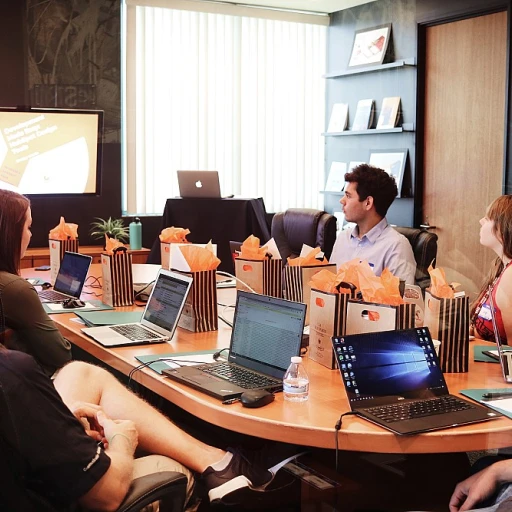
The Changing Landscape of Pharmaceutical Education
Transformative Trends in Pharmaceutical Education
The landscape of pharmaceutical education is undergoing a paradigm shift, primarily driven by the rapid evolution in both the industry and its associated educational practices. As pharmaceutical companies strive to meet the growing demands for innovation and regulatory compliance, the need for continuous learning and training has intensified. The traditional models of pharmaceutical training are being reconsidered to keep pace with the advancing needs of pharmaceutical professionals.
One prominent trend is the incorporation of life sciences into pharmaceutical training programs. This integration facilitates a more comprehensive understanding of the complex biological processes involved in drug development, enhancing the overall effectiveness of such programs. Moreover, the industry is witnessing a growing emphasis on training development and learning management systems, which are tailored to meet specific regulatory requirements and bridge existing skill gaps among employees.
The ever-evolving demands on pharmaceutical employees necessitate a focus on critical areas such as compliance and continuous learning. Programs are now not only about dispensing information but are geared toward ensuring that learners can apply knowledge in real-time, adapting to the fast-paced nature of regulatory changes. This shift is critical for professionals in the pharmaceutical sector, where the rapid advancement in data analytics and clinical trials can significantly impact public health outcomes.
For comprehensive insights into the modern demands for skills in this sector, exploring how these educational trends cater to the essential skills for tomorrow's workplace is crucial. Pharmaceutical training must thus evolve continuously, ensuring it addresses the multifaceted needs of the industry and prepares professionals effectively for the intricate challenges they encounter.
Technological Innovations Driving Learning
Embracing Digital Frontiers in Learning
As the pharmaceutical industry continues to evolve, technological innovations are reshaping how professionals acquire knowledge and develop skills. Pharmaceutical training is no longer confined to traditional classroom settings; instead, it has expanded into digital realms, offering new avenues for continuous learning and professional development. The introduction of online training programs has made it easier for employees to access educational content on-demand. This shift towards digital learning tools is driven by the industry's need for flexible, efficient, and scalable solutions. With advances in learning management systems, companies in the pharmaceutical sector can now offer tailored programs that cater to the specific needs of their teams. One notable application of technology in learning development is the use of data analytics. By leveraging real-time data, pharmaceutical companies can gain insights into the effectiveness of their training programs, allowing them to adjust their strategies to better meet the needs of their workforce. This data-driven approach not only helps professionals enhance their skills but also ensures that compliance with regulatory requirements is maintained. Further integration of virtual simulations and interactive modules provides employees with a more engaging and immersive learning experience. For instance, in clinical trials, professionals can practice complex scenarios in a controlled environment, thereby boosting their competence and confidence without the risk of real-world errors. As the industry continues to value continuous learning, it is clear that technological innovations are paving the way for more effective pharmaceutical training programs. By adopting these cutting-edge tools, companies can maintain a competitive edge while ensuring their workforce is equipped to face the challenges of tomorrow’s workplace. To learn more about essential skills in the future workplace and the role of technology in training, visit our article on preparing for tomorrow.Addressing Skill Gaps in the Workforce
Bridging Educational Gaps and Ensuring Regulatory Compliance
In today's pharmaceutical industry, addressing skill gaps is more crucial than ever. Ensuring employees possess the necessary skills and knowledge is not only beneficial for individual development but also vital for companies to remain competitive and compliant.
One significant challenge is the evolving regulatory landscape. As regulatory requirements become increasingly complex, pharmaceutical professionals must be equipped with the knowledge to navigate these changes. Compliance is paramount, making continuous learning and development programs essential for maintaining high standards in product safety and efficacy.
- Regulatory Alignment: Companies must ensure their learning initiatives align with updated regulatory frameworks, enabling employees to stay informed of the latest compliance requirements.
- Skill Enhancement: Training programs should focus not only on compliance but also on the broader skills necessary for the pharmaceutical sector, including data analysis, program management, and innovation.
- Continuous Improvement: Pharmaceutical companies must foster a culture of continuous learning, whereby employees are encouraged to regularly participate in training development activities that reinforce their existing skills and introduce new knowledge areas.
Incorporating learning management systems and online platforms can help professionals access pharmaceutical training more effectively. These tools facilitate real-time feedback and adapt content to individual learning paths, ensuring that training is not only relevant but also retains engagement. For those responsible for human resources and learning development, leveraging data from training programs is crucial. Analyzing this data helps identify gaps in skills and knowledge, allowing organizations to tailor future development efforts more effectively.
The Role of Collaboration in Learning
Fostering a Collaborative Learning Environment
In the ever-evolving pharmaceutical sector, collaboration stands as a cornerstone for effective learning and development. As the industry faces rapid technological advancements and stringent regulatory requirements, fostering a collaborative environment becomes essential for pharmaceutical professionals to thrive. By encouraging teamwork, companies can enhance the sharing of knowledge and skills among employees, ultimately leading to improved outcomes in both training and compliance.
Collaboration in learning is not just about working together on projects; it's about creating a culture where continuous learning is valued and supported. This approach helps professionals stay updated with the latest industry trends and regulatory changes. By utilizing collaborative platforms, pharmaceutical companies can facilitate real-time communication and knowledge sharing, ensuring that all employees are on the same page regarding new developments and best practices.
Moreover, collaborative learning aids in addressing skill gaps by allowing employees to learn from each other's experiences and expertise. This peer-to-peer learning model is especially beneficial in the pharmaceutical industry, where the complexity of clinical trials and regulatory compliance demands a deep understanding of various processes. Training programs that incorporate collaborative elements can lead to more effective learning outcomes, as they enable employees to apply theoretical knowledge in practical scenarios.
Human resources and learning management teams play a crucial role in fostering this collaborative environment. By designing training programs that emphasize teamwork and interactive learning, they can create opportunities for employees to engage with one another and develop critical skills. Additionally, leveraging data from learning management systems can help identify areas where collaboration is most needed, allowing companies to tailor their learning initiatives accordingly.
In conclusion, collaboration in learning is a vital component of training development in the pharmaceutical sector. By creating an environment that supports continuous learning and knowledge sharing, companies can ensure that their workforce is equipped to meet the challenges of the industry and contribute to the advancement of public health.
Personalized Learning Paths for Professionals
Tailored Learning Journeys for Pharma Professionals
In the ever-evolving pharmaceutical sector, personalized learning paths have emerged as a crucial component in the advancement of employees' skills and knowledge. As the industry faces new regulatory requirements and technological innovations, traditional one-size-fits-all training no longer meets the diverse needs of pharmaceutical professionals. Modern learning management systems have adapted to provide more flexible and targeted training programs. Pharmaceutical companies are utilizing data-driven approaches to design L&D initiatives that cater to individual learning styles and career development goals. These tailored programs allow employees to gain expertise in niche areas while maintaining compliance with regulatory standards. Personalized learning paths also enable continuous learning, which is essential in keeping up with the rapid pace of advancements in life sciences and clinical trials. Employees are encouraged to engage in online programs that offer real-time updates and insights, helping them stay ahead in the competitive landscape. Moreover, custom training development is not only about meeting the immediate needs of pharmaceutical professionals but also about preparing them for future challenges in the industry. By focusing on employee-specific skills development, companies ensure their workforce is equipped to address skill gaps efficiently. Ultimately, personalized training development helps professionals enhance their capabilities, contributing to better management and improved public health outcomes. Emphasizing collaborative and continuous pharmaceutical training, the industry sets a standard for employee growth, building a robust learning culture that supports both individual and organizational success.Measuring the Impact of Learning Initiatives
Evaluating the Effectiveness of Training Programs in Pharma
In the pharmaceutical industry, measuring the impact of learning initiatives is crucial for ensuring that employees and professionals gain the necessary skills and knowledge. The dynamic nature of the pharmaceutical sector requires companies to maintain rigorous training programs that align with regulatory requirements and industry standards. To assess the effectiveness of these programs, several strategies can be employed:- Utilize Data Analytics: Leveraging data analytics helps companies quantify the outcomes of their learning and development (L&D) initiatives. By analyzing real-time data, pharmaceutical companies can track employee performance, engagement, and overall program success.
- Feedback Mechanisms: Regularly collecting feedback from employees participating in training helps fine-tune the course content. This feedback loops aids in creating more personalized learning paths and addressing skill gaps highlighted in earlier sections.
- Compliance Tracking: Ensuring compliance with regulatory bodies is a significant aspect of pharma training. Tracking compliance rates post-training can serve as a direct measure of program success, ensuring knowledge transfer in areas such as regulatory compliance and public health standards.
- Performance Metrics: Establishing clear performance metrics before the commencement of training programs provides a benchmark for measuring impact. These metrics could include retention rates, completion rates, and improved employee performance in clinical trials or regulatory tasks.
- Continuous Improvement: The pharmaceutical industry thrives on continuous learning and development. Revisiting and revising L&D strategies to adapt to technological innovations and the changing landscape of pharmaceutical education ensure that training remains relevant and impactful.













